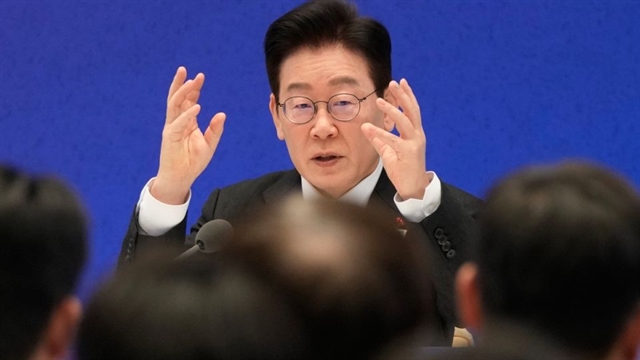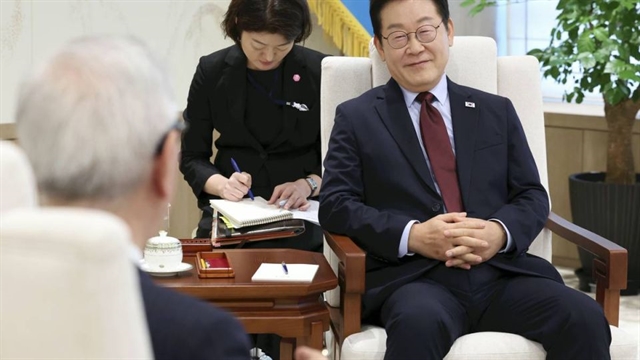 World
World


|
| South Korean President Lee Jae Myung speaks during an exclusive interview with The Yomiuri Shimbun in Seoul on Tuesday, August 19. — THE YOMIURI SHIMBUN/ANN Photo |
SEOUL — In an exclusive interview with The Yomiuri Shimbun, South Korean President Lee Jae Myung stressed that he intends to uphold the agreements that previous administrations reached with Japan regarding the issue of so-called comfort women and lawsuits related to former wartime requisitioned workers.
Speaking at the presidential office in Seoul on Tuesday, Lee described the presence of Japan as 'extremely crucial' and expressed a strong willingness to strengthen economic and security ties between the two countries.
Lee answered questions over about 90 minutes from Shoichi Oikawa, chairman of the board and representative director of The Yomiuri Shimbun Holdings. Oikawa also serves as editor-in-chief of the Yomiuri group.
This was Lee’s first interview with a foreign media outlet since he took office in June.
"The presence of Japan is extremely crucial, and I hope the presence of South Korea will also become meaningful to Japan," Lee said of bilateral relations. "It is important to work together in areas where cooperation is possible and to seek paths that are beneficial to both sides."
Regarding historical issues such as comfort women and former wartime requisitioned workers from the Korean Peninsula, which have been sources of conflict between Japan and South Korea, Lee said: "There is no need to stick only to those issues, and there is no need to bury ourselves in them.
"It is necessary to face the facts accurately and make efforts to resolve the issues without causing harm to any side."
In 2015, the administration of then Prime Minister Shinzo Abe confirmed with the administration of then South Korean President Park Geun-hye that the issue of comfort women had been "resolved finally and irreversibly." The administration of Lee’s predecessor, Yoon Suk Yeol, worked out measures to resolve the issue of former requisitioned workers in 2023.
In both cases, Lee’s left-leaning Democratic Party strongly opposed these agreements. However, the president has emphasised the importance of Japan-South Korea relations and expressed his intention to maintain the agreements since assuming the presidency.
In the interview, Lee reiterated such a stance on the agreements concerning comfort women and measures to resolve the issue of lawsuits over the former wartime labourers.
"It is greatly difficult for the South Korean people to accept the agreements, but they are promises between the countries," he said. "Trust is at stake, so it is not desirable to overturn it."
"On the other hand, we have a responsibility to seriously consider the perspectives of the victims and their families. I hope that South Korea and Japan will engage in serious discussions from a long-term perspective and with a fundamental awareness of these issues," Lee also said, seeking for Japan to consider the feelings of the South Korean people.
Lee is scheduled to visit Japan on Saturday and Sunday, his first trip to the country as president. Regarding the summit with Prime Minister Shigeru Ishiba scheduled for Saturday, he said, "I want to discuss areas where cooperation is possible."
He expressed his intention to talk about the expansion of bilateral cooperation in the areas of economy, security and people-to-people exchanges. The president also stressed the need for frequent reciprocal visits by the leaders of Japan and South Korea.
During the interview, Lee referred to the Japan-South Korea Joint Declaration issued by the administrations of then Japanese Prime Minister Keizo Obuchi and then South Korean leader Kim Dae Jung in 1998, applauding it as "having drawn a new line in Japan-South Korea relations."
Lee also expressed his eagerness to work out a new joint statement. "I hope we can build a future-oriented relationship by releasing a new declaration on Japan-South Korea relations that will further advance [relations] and overcome [challenges]." — THE YOMIURI SHIMBUN